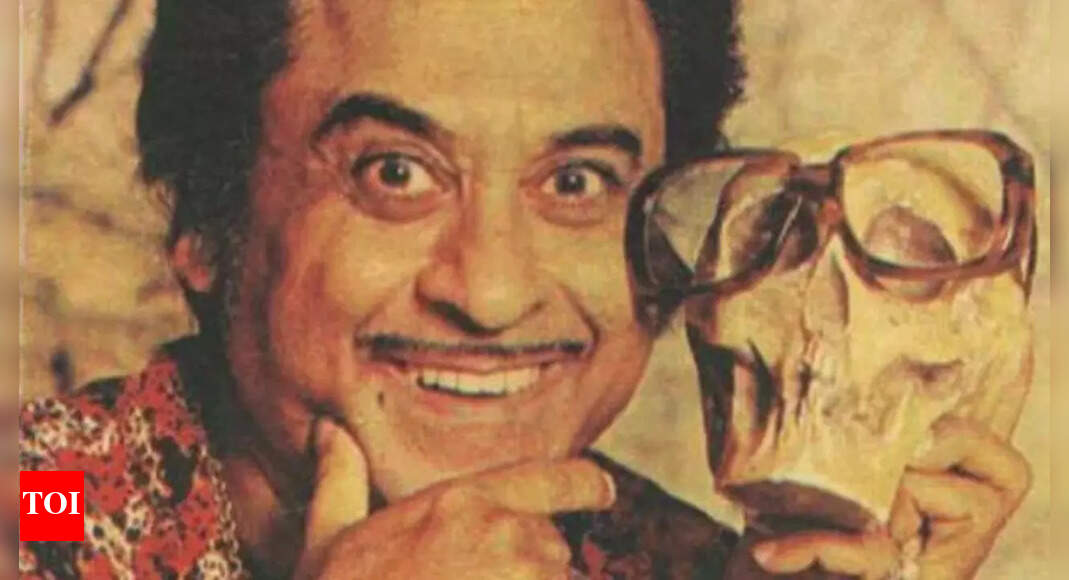 Agencies
AgenciesKishore Kumar, the iconic voice that defined generations of Indian music lovers, was not just known for his chart-topping melodies or his comical silver-screen performances—his offbeat lifestyle often stole the limelight too. From rumours about ghostly habits to trap doors in his house, his name has long been wrapped in a shroud of delightful eccentricity. But did Kishore da really keep skulls and bones at home? His son, singer Amit Kumar, recently addressed this mystery—and the answer is as surprising as it is fascinating.
In an interview with journalist Vickey Lalwani, Amit Kumar candidly unpacked some of the most talked-about myths about his legendary father. One enduring tale was Kishore Kumar’s alleged penchant for collecting human skulls and bones, supposedly to scare off unwelcome visitors.
But the truth, as Amit reveals, is far more grounded—yet still deeply characteristic of Kishore's quirky charm. The objects in question weren’t spooky relics but cultural souvenirs from a family trip to East Africa.
Amit also shared that Kishore Kumar had an enduring admiration for African culture—its music, beads, and traditional artifacts. His passion for global art forms reflected not only in his collection but in the expansive musical palette he carried through his career.
When it came to the public perception of his eccentricities, Kishore Kumar wore the label with amusement rather than resistance. He was self-aware, witty, and unfazed by the outlandish stories.
Amit fondly remembered his father’s response to such tales: “Woh khud par mazak karte thay. He used to say, ‘Theek hai, duniya kehti mujhe pagal, main kehta hoon duniya ko pagal… bolne do pagal… achha hai, kyun na?’”
(Translation: “Fine, the world calls me mad. I say the world is mad... let them say I’m crazy. Why not?”)
One such rumour once led filmmaker SD Narang to stomp around the singer’s house, convinced there was a hidden trap door that could swallow visitors whole. Kishore da simply laughed and assured him it was all fiction. That was the genius of Kishore Kumar—he lived in a world where myth and mischief coexisted in perfect harmony. Kishore Kumar’s career remains unparalleled. Beginning as a chorus singer with Bombay Talkies and evolving into a multi-talented superstar, he acted, directed, composed, and of course, sang his way into history. With over 2,900 songs across languages and an artistic vision that knew no borders, Kishore Kumar was—and still is—a cultural phenomenon.
In an interview with journalist Vickey Lalwani, Amit Kumar candidly unpacked some of the most talked-about myths about his legendary father. One enduring tale was Kishore Kumar’s alleged penchant for collecting human skulls and bones, supposedly to scare off unwelcome visitors.
But the truth, as Amit reveals, is far more grounded—yet still deeply characteristic of Kishore's quirky charm. The objects in question weren’t spooky relics but cultural souvenirs from a family trip to East Africa.
“We had gone to perform in East Africa, Nairobi. He had a hobby of collecting such curios. So, on our way back, we brought them home,” Amit said. “In fact, they are still there, preserved in the family trust.”
Amit also shared that Kishore Kumar had an enduring admiration for African culture—its music, beads, and traditional artifacts. His passion for global art forms reflected not only in his collection but in the expansive musical palette he carried through his career.
When it came to the public perception of his eccentricities, Kishore Kumar wore the label with amusement rather than resistance. He was self-aware, witty, and unfazed by the outlandish stories.
Amit fondly remembered his father’s response to such tales: “Woh khud par mazak karte thay. He used to say, ‘Theek hai, duniya kehti mujhe pagal, main kehta hoon duniya ko pagal… bolne do pagal… achha hai, kyun na?’”
(Translation: “Fine, the world calls me mad. I say the world is mad... let them say I’m crazy. Why not?”)
One such rumour once led filmmaker SD Narang to stomp around the singer’s house, convinced there was a hidden trap door that could swallow visitors whole. Kishore da simply laughed and assured him it was all fiction. That was the genius of Kishore Kumar—he lived in a world where myth and mischief coexisted in perfect harmony. Kishore Kumar’s career remains unparalleled. Beginning as a chorus singer with Bombay Talkies and evolving into a multi-talented superstar, he acted, directed, composed, and of course, sang his way into history. With over 2,900 songs across languages and an artistic vision that knew no borders, Kishore Kumar was—and still is—a cultural phenomenon.
And perhaps, it was this very spirit—curious, humorous, fearless—that made him gravitate toward the unusual, be it music or mementos.
So, did Kishore Kumar collect skulls and bones? Yes. But not to haunt anyone—only to remind us that art, like life, is most magical when it doesn’t conform.











